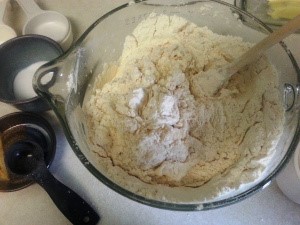by
Rhonda Browning White
Today we’re sharing this popular (and accurate) blog essay, “Six Things You Need to Know About Your Writer,” written by IFW editor, Rhonda Browning White. You can read more of Rhonda’s essays with reading recommendations, writing advice, travel, dining, and even an occasional recipe or two, on her blog, Read.Write.Live! at RhondaBrowningWhite.com.
So your friend—or, God help you, your spouse—is a writer. Chances are, the more you get to know your writer, the more confused you’ll feel. Writers are odd ducks. We’re fun. We’re irritating. We’re enigmas and amoebas. How are you supposed to make sense of someone who flip-flops more than cheap rubber shower thongs? It’ll help you to know a few things about us that might make us a little easier to understand. Or not. No one says we are easy.
1. We are extroverted introverts. Writers realize the importance of socialization; in fact, we’re often pushed to network, self-promote, and mingle in order to make the necessary connections to publish our work, or sell it once it is published, so that we can publish again. We can juggle Facebook, Pinterest, and Twitter, all while texting and providing riotous dinner-party banter. Sometimes we are wildly gregarious, prone to spontaneous road trips or bar-hopping. We can be the life of the party, cracking witty jokes you can’t wait to tell your friends at the water cooler, and boogying to every song the band plays. Don’t count on our amusing behavior to last, however, because . . .
2. We are introverted extroverts. You know that party we looked forward to all week? The one we chattered about incessantly, the one for which we bought a sparkly dress and fabulous shoes? We might arrive and sit quietly in a corner. Yes, last weekend we sang karaoke at midnight and break-danced as an encore, but this weekend we’re happy to play the wallflower, soaking up all that energy we expended the last time we were out. We’re having fun—don’t think we aren’t, even if we’re not smiling—because we’re watching, we’re processing, and we’re thinking. And it’s likely that something we see, hear, smell, feel, or taste will show up later in the story we’re writing.
3. We are usually right. Writers are sometimes perceived as know-it-alls. It isn’t that we believe we know everything, though we surely wish we did. We’re avid researchers, constant readers, and we’re always questioning how this works and why that doesn’t. We study the ingredients on cereal boxes. Our dictionaries actually wear out from overuse. Our Google search history could easily get us arrested. We’re smart, because we thirst for knowledge like a sponge in the Sahara Desert, and we’ll track down an expert for answers as doggedly as if he were the Aquafina man. When we offer unsolicited advice, consider it a gift (this is one we hope you’ll return!), because we give it in the spirit of helpfulness, not haughtiness.
4. But we are often wrong. And it breaks our hearts. It embarrasses us. Mortifies us. Many times, we know the answer, but our always-in-overdrive brains sometimes can’t shift gears quickly enough to turn a tight corner. So when you ask us the difference between a simile and a metaphor, and we answer incorrectly—though we’ve known the answer at a cellular level since third grade—it isn’t because we’re dumb. It’s because our minds are absorbing new information, or we are creating a new character in our minds, or writing a scene for a work in progress—or all of this is happening simultaneously in our heads while we’re attempting to answer your question. Besides, if we truly don’t know the answer, you can bet we’ll look it up.
5. We are not ignoring you. Yes, you’ve said our name three times, and when we finally respond, we ask you to repeat yourself twice. It’s sometimes difficult for us to come back to this planet when we are in a world of our own making. We are often visiting universes that we’ve created inside of our heads. We have to go there. Have you ever read a story and envisioned the scene as if it were playing out in front of you? That’s because a writer became so intensely involved in the creation of that setting that she pictured it in vivid detail—scents, sounds, surfaces, and more—so much so that she temporarily blocked out this world in order to create that one. It’s a necessary part of the job, and it’s what makes us good at what we do. It’s hard to hear you when we’re intently listening to the monologue or dialogue inside of our heads. Be patient. Repeat yourself. We’ll catch up to you.
6. Except when we’re ignoring you. Writing is a solitary profession driven by creativity that requires deep internal thought. The busyness and business of everyday life must be shut out both mentally and physically for us to work at peak capacity and get in touch with our highest creative selves. We’re okay with shutting the door—and locking it. We’re fine going all week without television, and we may equally be fine letting it play all day on the same unwatched channel. We don’t feel guilty letting your call go to voicemail. (In fact, when we’re writing, a ringing phone can be the equivalent of a pipe bomb exploding in our laps.) We can exist for days on coffee and candy corn or wine and Doritos. Don’t worry. We’ll come around soon enough, and we’ll again be ready to jabber until your ears wear out or spin you around the dance floor until your legs grow numb.
We know we’re different. We’re okay with that. And we hope with every breath that you’re okay with it, because we need you. When we come back to this earth, this country, this room, we want to find you there. After all, it’s you we’re writing for.
Tip for Writers: Be sure to email the link to this article to your your friend or significant other, or print it out and strategically place it where they will see it. Then get back to writing.










